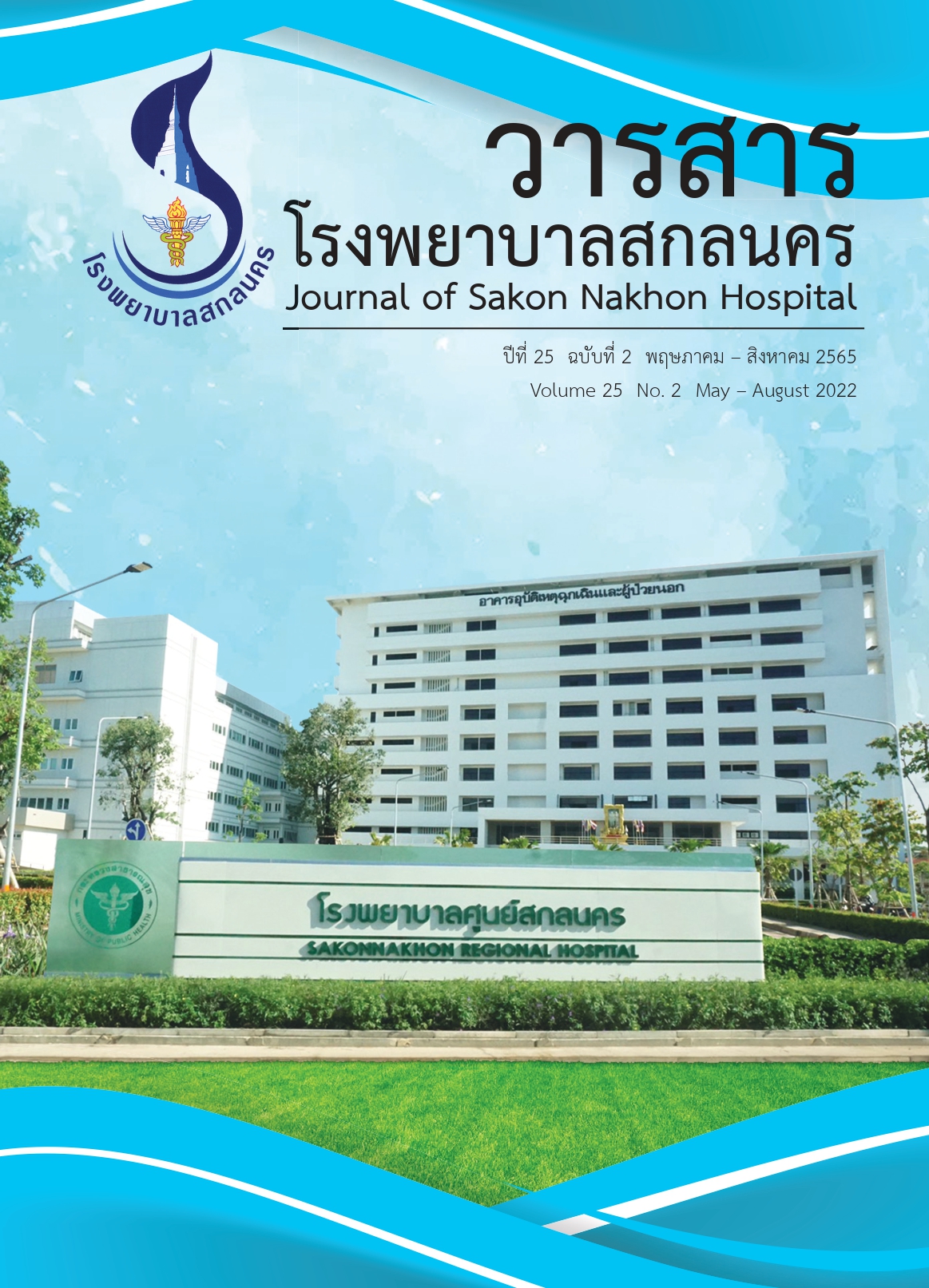Experience and Self–management on Volume Overload in Patients with End–Stage Renal Disease undergoing Hemodialysis
Keywords:
Self–management, Volume overload, Hemodialysis, End–stage renal diseaseAbstract
This qualitative research aimed to study the self–management on volume overload in patients with end–stage renal disease undergoing hemodialysis. The Heidegger’s hermeneutic phenomenological approach was applied in this study. The informants were patients with end–stage renal disease undergoing hemodialysis. They had an experience of volume overload a year ago. Twenty informants were purposively recruited at the hemodialysis unit in Mahasarakham hospital. This study was conducted from June to July 2022. The data were collected using individual in–depth interviews. The data trustworthiness was established following Lincoln and Guba’s criteria. The data were analyzed by content analysis.
The findings of this study were composed of 4 themes including: 1) Giving the meaning of volume overload, kidney degeneration and edema 2) Self–management of volume overload, a fluid restriction, diet control, taking medicine and mental self–management 3) The effects of volume overload, physical aspect; dyspnea, orthopnea and mental aspect; fear/ anxiety, boredom and uncertainty of life and 4) Factors affecting volume overload, self–management, healthcare workers and caregivers.
The findings could be applied to other patients for self–care management to prevent the volume overload and used as information for program development to enhance patients’ awareness in changing their lifestyles and self–management and for promoting the patients’ self–care behaviors as appropriate and sustainable.
References
ศุภดีวัน พิทักษ์แทน. การพยาบาลผู้ป่วยไตวายเรื้อรังระยะสุดท้ายที่ได้รับยาระงับความรู้สึกเพื่อผ่าตัดปลูกถ่ายไต: กรณีศึกษา. ว. วิชาการแพทย์2562;33(3):589–600.
กลุ่มงานยุทธศาสตร์และสารสนเทศทางการแพทย์โรงพยาบาลมหาสารคาม. รายงานสถิติโรงพยาบาลมหาสารคาม ปี2563–2565. มหาสารคาม: โรงพยาบาลมหาสารคาม; 2565.
Liu Y, Wang L, Han X, Wang Y, Sun X, Jiang H, et al. The profile of Timing Dialysis Initiation in Patients with End–stage renal Disease in China: A Cohort Study. Kidney Blood Pressure Research 2020;45(2):180–93.
Wayunah W. Self–Efficacy and Compliance Fluid Intake Restriction as a Determinant of The Interdialytic Weight Gain (IDWG) Level. Journal of Nursing Care 2022;5(1):21–29.
รัตนา เสือสุ่ม และรัชนีนามชูจันทรา. ผลของโปรแกรมการส่งเสริมสมรรถนะแห่งตนในการควบคุมน้ำต่อพฤติกรรมการควบคุมน้ำและการเปลี่ยนแปลงน้ำหนักตัวในผู้ป่วยโรคไตระยะสุดท้ายที่ได้รับการฟอกเลือดด้วยเครื่องไตเทียม. ว. พยาบาลสภากาชาดไทย 2562;11(2):188–203.
รุ่งรักษ์ ภิรมย์ลาภ. การพยาบาลผู้ป่วยฟอกเลือดด้วยเครื่องไตเทียมในภาวะไตวายเฉียบพลัน: กรณีศึกษา. ว. โรงพยาบาลสกลนคร 2564;24(1):94–105.
Covic A, Siriopol D. Assessment and management of volume overload among patients on chronic dialysis. Current Vascular Pharmacology 2021;19(1):34–40.
Canaud B, Hornig C, Bowry S. Update and Perspectives in the Personalized Management of Sodium, Water, Volume and Hemodynamic Disorders of Dialysis Patients. Medical Research Archives 2022;10(6):1–12.
ชัชวาล วงค์สารีและจริยา กฤติยาวรรณ. การให้ความรู้แบบเข้มข้นเพื่อบำบัดภาวะน้ำเกินในผู้ป่วยโรคไตวายเรื้อรังระยะสุดท้ายที่ฟอกเลือดด้วยเครื่องไตเทียม: บทบาทพยาบาลไตเทียม. ว. มฉก.วิชาการ 2560;21(41):137–150.
Perez LM, Biruete A, Wilund KR. Home–delivered meals as an adjuvant to improve volume overload and clinical outcomes in hemodialysis. Clinical Kidney Journal 2022;1–35.
สุภาพร ไชยวัฒนตระกูล. การพัฒนารูปแบบการป้องกันภาวะน้ำเกินในผู้ป่วยโรคไตเรื้อรังระยะสุดท้ายที่ฟอกเลือดด้วยเครื่องไตเทียม.ว.วิทยาศาสตร์สุขภาพและการสาธารณสุขชุมชน 2561;1(2):131–146.
Damas J, Fernandes V. Assessment of Fluid Status in Dialysis: Clinical Importance and Diagnostic Tools. Port J Nephrol Hypert 2022;36(2):115–120.
วรรวิษา สำราญเนตร, นิตยา กออิสรานุภาพ และเพชรลดา จันทร์ศรี. การจัดการตนเองเพื่อป้องกันภาวะน้ำเกินของผู้ป่วยโรคไตเรื้อรังระยะสุดท้ายที่ได้รับการฟอกเลือดด้วยเครื่องไตเทียม. ว. วิจัยและพัฒนาด้านสุขภาพ 2563;6(2):5–20.
พิมพ์พลอย มหานุภาพ, โรจนีจินตนาวัฒน์และพนิดา จันทโสภีพัน์. ความรอบรู้ด้านสุขภาพและการจัดการตนเองในผู้สูงอายุที่ได้รับการฟอกเลือดด้วยเครื่องไตเทียม. ว. สภาการพยาบาล 2565;37(1):108–124
ธนัยรัตน์ รุ้งพราย และ ทัศนา ชูวรรธนะปกรณ์. ผลของโปรแกรมการจัดการตนเองของบุคคลและครอบครัวต่อภาวะน้ำเกินในผู้สูงอายุโรคไตวายเรื้อรังที่รับการฟอกเลือดด้วยเครื่องไตเทียม. ว. พยาบาลศาสตร์จุฬาลงกรณ์วิทยาลัย 2563;30(1):96–107.
อัญญา ปลดเปลื้อง. การวิเคราะห์ข้อมูลเชิงปรากฏการณ์วิทยา. ว. พยาบาลกระทรวงสาธารณสุข 2556;23(2):1–10.
Lincoln YS, Guba EG. (1985). Naturalistic inquiry. New burg Park: Sage Publication; 1985.
วณิชา พึ่งชมภู. การพยาบาลผู้ป่วยโรคไตเรื้อรังที่ได้รับการฟอกเลือด. เชียงใหม่: สำนักพิมพ์มหาวิทยาลัยเชียงใหม่ ศูนย์บริหารงานวิจัย มหาวิทยาลัยเชียงใหม่; 2559.
Zoccali C, Mallamaci F. Mapping progress in reducing cardiovascular risk with kidney disease: Managing volume overload. Clinical Journal of the American Society of Nephrology 2018;13(9):1432–1434.
Loutradis C, Sarafidis PA, Ferro CJ, Zoccali C. Volume overload in hemodialysis : diagnosis, cardiovascular consequences, and management. Nephrology Dialysis Transplantation 2021;36(12):2182–93.
ยุทธชัย ไชยสิทธิ์, จุรีรัตน์กอเจริญยศ และอภิญญา กุลทะเล. ประสบการณ์และวิธีการจัดการตนเองของผู้ป่วยโรคไตเรื้อรังระยะสุดท้ายที่ฟอกเลือดด้วยเครื่องไตเทียม. ว. การพยาบาลและสุขภาพ มหาวิทยาลัยราชภัฏสวนสุนันทา 2563;1(2):42–61.
กรกฏ พร้อมสกุล และนลินียิ่งชาญกุล. ความชุกและปัจจัยที่สัมพันธ์กับภาระในการดูแลของผู้ดูแลผู้ป่วยไตวายระยะสุดท้าย: การศึกษาแบบภาคตัดขวางในคลินิกโรคไต อำเภอเมือง จังหวัดลำพูน ประเทศไทย. เชียงใหม่เวชสาร 2564;60(1):41–52
Downloads
Published
How to Cite
Issue
Section
License
บทความที่ตีพิมพ์ถือว่าเป็นลิขสิทธิ์ของวารสารโรงพยาบาลสกลนคร การคัดลอกเพื่อพัฒนาเชิงวิชาการต้องได้รับการอ้างอิงอย่างถูกต้อง






